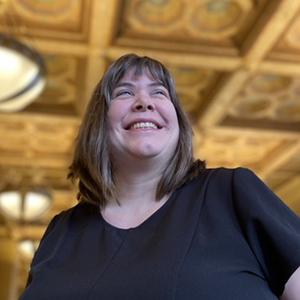by Sara Ring
Quick Summary
I kicked off 2016 by attending the American Library Association Midwinter meeting in Boston. There was one session in particular that inspired me to think more about my future, and our shared future in libraries. I attended the panel session called “Creativity, Innovation and Change: Libraries Transform in the Digital Age!”

I kicked off 2016 by attending the American Library Association Midwinter meeting in Boston. There was one session in particular that inspired me to think more about my future, and our shared future in libraries. I attended the panel session called “Creativity, Innovation and Change: Libraries Transform in the Digital Age!” All of the speakers discussed ways in which the library profession can bring awareness of the value of libraries to decision makers. ALA President Sari Feldman introduced Libraries Transform, the new three year library public awareness campaign that launched October 29, 2015. The goals of this campaign are: to increase awareness of libraries, shift perceptions that libraries are nice to have to the idea that libraries are essential, and to energize library professionals. ALA has developed a toolkit on the web that includes the top 10 ways you can engage with the libraries transform campaign. ALA President-Elect Julie Todaro followed and announced her plans for year two of the campaign “Libraries Transform: the Expert in the Library," which will focus on library staff expertise.
Alan S. Inouye, Director of ALA’s Office for Information Technology Policy was the third speaker on the panel. As a profession, we know profound changes in libraries are underway, but our decision makers have perceptions that are too often based only in the past. We need to re-engineer national policy, and policy advocacy messaging is informed by work such as the Libraries Transform campaign, and work by others such as the speaker that followed, Jonathan Zittrain. Jonathan Zittrain is the co-founder, director, and faculty chair of the Berkman Center for Internet & Society at Harvard University. He framed his talk by focusing on and revisiting four core values of libraries, values that are essential to a free society: freeing the worlds knowledge, catalyzing contributions, cultivating scholarly skills, and contributing actively and fiercely to the developments of free information platforms. He then gave examples of what they’ve been doing at the Berkman Center and other places to support these values.
As an example of freeing the worlds knowledge, Harvard Law Library recently announced details about their "Free the Law" digitization project. The Law Library has case law going back about 200 years. These are reports of judges’ decisions from every jurisdiction in the United States since 1817. They plan to digitize around 40,000 volumes, and make the collection freely available to the public. Currently, online access to this information is only organized and made available through commercial databases. Zittrain mentioned that a researcher in California took all the California case law that had been digitized and created word clouds for each year. One could visualize the top issues going back hundreds of years. I can think of one other recent example of freeing the worlds knowledge. In early 2016, New York Public Library released more than 180,000 digitized items from their archives in the public domain and allow users to download high resolution copies of the items. To further encourage use of their digital content, they have a new Remix Residency program.
Catalyzing contributions was the next core value that Zittrain discussed. He spoke about the cost of law books. For example, a Tort law course book costs around $200.00 for each book used in the course. Though if you look at the content of the book, about 95% of it is in the public domain. What if law professors could create their own playlists of cases (like an iTunes for law courses) that students could use instead? Zittrain showed an example of an annotation tool that both professors and students could use. Faculty can share and contribute to other faculty playlists.
Cultivating scholarly skills is another core value of libraries according to Zittrain. He told the story of SciGen, an application that can generate nonsense scientific papers automatically. The publisher Springer released a statement back in February 2014 that there were a number of fake conference proceedings appearing in their journals. SciGen was created at MIT back in 2005 to show that conferences would accept meaningless papers. Library staff can help students, scholars, and the public distinguish between what is truth and what is false. I also recently came across Pew Rearch Center survey findings showing that 24% (a lot) and 41% (somewhat) said that libraries help people decide what information they can trust. Take a look at the other interesting findings that show how libraries fit into communication education ecosystems.
Contributing actively and fiercely to the developments of free information platforms was the last value discussed. Platforms like the Internet and Creative Commons are examples of this. These are un-owned technologies. We can watch while others develop paid platforms, or contribute to the development of free information platforms. In today’s age, it’s also quite easy to censor digital content. Zittrain gave the example of when Amazon reached in and pulled out/deleted all copies of the book 1984 from Kindle owners who had purchased the book. Apparently it was added to the Kindle store by a company that didn't have the rights to the book. Zittrain also stated that we need to defend the integrity of the document. Other examples of people and organizations practicing this were mentioned such as:
- LOCKSS (Lots of Copies Keep Stuff Safe)
- Perma.cc allows scholars, journals, courts, and others to create permanent records of the web sources they cite (archive the links).
- Internet Archive
As we move forward in 2016, I"m hopeful that we'll continue to see projects and services in our region that reiterate our value to our communities.
